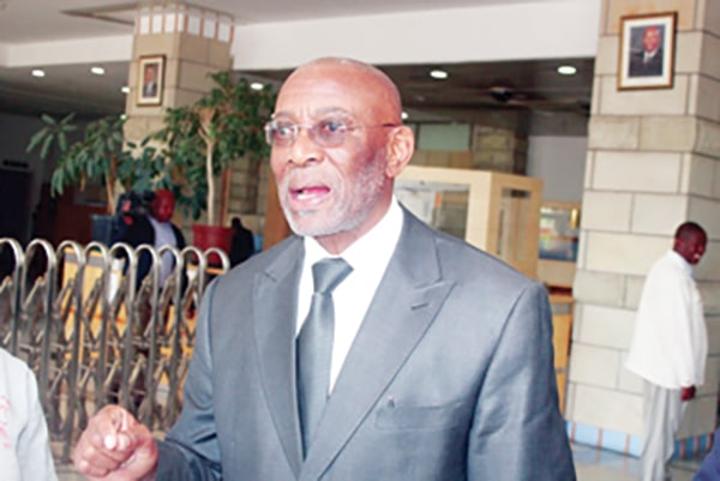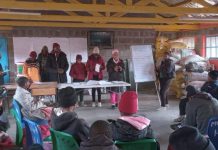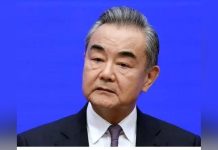Africa-Press – Lesotho. Attorney General Haee Phofoolo yesterday conceded the government needed to hold inquests into numerous “mysterious deaths” that have occurred in the country in the recent past in the interests of justice.
can report the spike in the number of unexplained killings over the last two decades has blighted the country’s justice system, a blot further sullied by government’s failure to organise inquests into the shooting that occurred at Ratjomose Barracks on September 5, 2017.
Pressure on government to hold inquests was cranked up this week when the late Colonel Tefo Hashatsi’s mother ’Mats’epo Hashatsi called on Prime Minister Thomas Thabane’s coalition administration, to investigate circumstances surrounding her son’s death.
Hashatsi died in a hail of bullets along with Brigadier Bulane Sechele and army commander Lt. Gen. Khoantle Motsomotso. In an interview in Mafeteng, ’Mats’epo said Lesotho Defence Force (LDF) Spokesperson Mashili Mashili, had exonerated her son in his testimony to a Court Marshal last November.
Mashili told the court Hashatsi was neither the aggressor not instigator of the attack but he tried to restrain Sechele from attacking Mots’omots’o. AG Phoofolo K. C.
acknowledged on Tuesday this week that an inquest into Hashatsi’s death and several other unexplained homicides, was a necessity, as a matter of principle and not necessarily as a result of Mashili’s court-martial testimony.
Phoofolo urged the Hashatsi family and their lawyer to write to the Director of Public Prosecutions (DPP), to demand that an inquest be established under Lesotho’s Proclamation Act of 1954.
The Act reads in part that: “It shall be the duty of every person who finds the dead body of a person who appears to have come by his death otherwise than from natural causes, or to whom the knowledge of any such death may come; or to whom any such death is reported, to notify as soon as possible the finding, knowledge or report together with any other facts in connection therewith which are known to him, to the District Commissioner”.
According to Phoofolo, it had been decades since an inquest was conducted in Lesotho, adding that because he was worried, the first thing he enquired about when he assumed office of AG, was in relation to inquests.
“Not just Hashatsi’s death but many more need to be investigated. The Hashatsi family should ask their lawyer to help them write to the DPP to demand an inquest.
That death has not been investigated and nobody has been tried for it,” Phoofolo said. Besides serving the interests of justice, inquests helped remove any suspicion that may be lingering over a case and give closure to aggrieved families.
Some unsolved murders include the cold-blooded killings of former prime Minister Pakalitha Mosisili’s son Maile, former Basotho National Party (BNP) leader Bereng Sekhonyana and businessman Thabiso Tsosane.
’Mats’epo said following Mashili’s account of events, government should have immediately contacted her family and facilitated an inquest into her son’s “mysterious death”.
’Mats’epo added that government’s deathly silence made her suspicious that her son’s death was a plot to eliminate him, hence the alleged delay in rushing him to hospital after he was shot.
She further submitted that if government were to set up an inquest, it would also help her redeem her Alliance Insurance Company funeral policy which is locked because police alleged Hashatsi went to Motsomotso’s office to attack the late LDF commander.
The bereaved mother also said that all she wanted was justice for her son and that if government failed to establish an inquest “I will be left with no choice but to approach the courts to force government’s hand to set up an inquest”.
“I want answers. We need to know what happened on that day. Whoever shot my son should be arrested. Mashili has testified that Tefo did not shoot and that he was the one trying to restrain Sechele. “His testimony absolved my son.
And the only way we can all establish what really happened that day would be the establishment of an inquest so that all witnesses can be called to testify,” she said.
’Mats’epo said she was calling on government to speedily set up the inquest “to confirm that my son was lured to his death”.
“I am very disappointed that my son was killed for nothing, that his name has been dragged through the mud despite not taking part in Mots’omots’o’s shooting.
Mashili has confirmed my long-held suspicions that Tefo did nothing wrong, that he was wrongfully killed. My child was killed for a sin he did not commit,” ‘Mats’epo said.
“I am therefore calling on government to do something about it, especially after Mashili’s testimony. Government’s silence since Mashili’s testimony doesn’t sit well with me. It’s as if nothing has happened and that Mashili’s testimony meant nothing.
She added: “One would have thought that following the court martial testimony, government would have made contact with the Hashatsi family, for my son’s name has been absolved.
’Mats’epo called on the Southern African Development Community (SADC) as mediators to Lesotho political instability and insecurity challenges, to nudge government.
“I call on Sadc to spur government into action. I actually thought that SAPMIL could do something because the testimony was made in their presence. Should they not have done something?” ’Mats’epo asked.
She further revealed that if more time passed without government establishing the inquest into Colonel Hashatsi’s death, her family planned to instigate a lawsuit compelling government to investigate the death.
“If more time passes without government doing something about my son’s death, we will be left with nothing but to take the bull by the horns.
If we fail to convince both SADC and the Lesotho government that there must be an inquest into my son’s death, we will be left with no choice but to instigate a lawsuit against them,” ‘Mats’epo said.
“If I were government I wouldn’t drag my feet but obviously that’s what they are doing. I guess they are waiting for the worst. ” Col.
Hashatsi’s mother also lamented the slow pace of the Lesotho justice system, expressing fears that she might die before clearing her son’s name. “I fear that I will die before my son’s name can be absolved.
Lesotho is a strange country whose justice system is unreliable. I fear that if I die before I succeed in absolving my son, no one else can take the fight up,” ’Mats’epo said.
In his testimony to the Court Martial last November Lt. Col. Mashili said he was in Mots’omots’o’s office when Hashatsi and Sechele walked in without knocking.
According to Mashili, Sechele saluted the Commander and told him that they were his visitors. Mots’omots’o told the two men to wait outside while he finished with him (Mashili). However, Mashili said, Sechele refused to wait outside as instructed.
Mashili added that at that juncture “Hashatsi tried to restrain Sechele, pulling his hand and asking him to leave but Sechele pulled his hand from Hashatsi, telling him to leave him alone saying “Ntlohelle uena monna”.
Mashili added Sechele was angry and advanced towards the Commander and asked him three times why he was selling them out to the police. “At that time I was shocked that a junior officer could talk to his senior in that manner,” Mashili narrated.
“At this point I was very afraid and looked at the gun holster of Brigadier Sechele and found it had no gun but couldn’t see the gun holster of Colonel Hashatsi as he was in the opposite direction,” Mashili testified.
As Sechele was leaning towards Motšomotšo, Mashili alleged that he then called the Commander by his name saying “Motšomotšo are you selling us out to the police?” He said during that tension, Lieutenant Colonel Ndeleni entered the Commander’s office and attention shifted towards him.
After that silence, Mashili claimed that Sechele leaned even closer to Motšomotšo, asking the same question over and over again, and that before the Commander could respond Sechele unzipped his jacket, pulled a gun and shot the army boss.
“I can’t even remember how many times he shot him,” Mashili said. He said he went down but shortly he got up and ran and realised everyone was running towards the door.
He said on his way out, he saw a soldier in camouflage uniform firing in his direction. When the shooting stopped he noticed Hashatsi lying on the ground but that he did not notice if he had sustained injuries.
Mashili said Colonel Hashatsi did not take part in the attack saying: “I did not see him doing anything”. Adv. Phoofolo told Public Eye that: “It has been a long time since an inquest was conducted in Lesotho.
I have not the slightest idea why this is the case. There have been so many deaths whose causes are yet to be established and where no judicial decision has been made,” Phoofolo said.
The AG said Mashili’s testimony as far as an inquest was concerned was “neither here nor there” but what was most important was to conduct investigations into aspects such as where Hashatsi had fallen after he was shot.
“Issues such as where Hashatsi had fallen after he was shot are facts that need to be established.
Those are facts that the judicial court needs to determine for a judicial decision to be made, to say whether the death was caused by a person or other factors,” AG Phoofolo said.
“Inquests are set up to establish facts where it is not clear what transpired.
Only evidence provided would help the court to establish facts, such as whether the cause of death was self-inflicted, or caused by another such as poisoning and so on. If it is found that the death was caused by another person, then police would investigate further. ”
He added: “In some cases, an inquest might not be able to determine the cause of death, especially in an instance where the body that is the subject of an inquest has decomposed.
Phoofolo added that while inquests determined facts and made judicial decisions, it was usually families that demanded investigations if they were not satisfied with circumstances surrounding the deaths of their loved ones.
“So, if the Hashatsi family were to demand that an inquest be established, obviously it would have to be done because no one has been tried for that death.
We would have to set up an inquest ultimately, to determine if there was anyone at fault, so that they could be tried,” Phoofolo said. “I wish the lawyer of the Hashatsi family could advise them to write to the DPP to demand to know the cause of death of their relative.
An inquest is a judicial investigation conducted by the Magistrate Court and is headed by an appointed magistrate. A lot of evidence is gathered from all available sources and witnesses that are available.
” The AG further acknowledged that government had overlooked scores of deaths quipping “why have we overlooked them?”
“How many deaths have occurred that have not been investigated? I am sure there will be a pile if we were to set up inquests for each of them.
For your information, when I discussed the revival on inquests with the PM (Prime Minister Thomas Thabane), I actually suggested that we could start with Maile Mosisili (former Prime Minister Pakalitha Mosisili’s son),” Phoofolo said.
“The other death is that if Bereng Sekhonyana who was the brother of the late Rets’elisitsoe Sekhonyana (former BNP leader).
That’s where we need to start. All files relating to those deaths were closed without providing clarity as to how the victims died. It is not right that people just die in a country that declares itself a democracy that protects human rights.
People shouldn’t just die. ” Phoofolo said he hoped Thabane’s government would “find it prudent to investigate people’s deaths”. “Magistrates should be assigned to investigate people’s deaths.
That’s what I am saying, that’s my position,” Phoofolo said. Then again on Wednesday, Phoofolo added that he would himself consult with the DPP with a view to issuing the instruction that that office established an inquest into Col.
Hashatsi’s murder. “I will take it upon myself to instruct the DPP to establish the inquest, to determine what exactly transpired and for the aggrieved family to find closure.
As I have said already, there are other people whom I have already mentioned who died under mysterious circumstances and whose deaths should also be investigated,” Phoofolo said.
In December 2018, former Basotho National Party (BNP) Secretary-General Lesojane Leuta, wrote to SAPMIL informing the force that was deployed to Lesotho, that Lesotho’s insecurity challenges could be unlocked if deaths such as Hashatsi’s were investigated.
In a letter dated December 4, 2018, addressed to US Ambassador to Lesotho Rebecca E. Gonzales, Leuta, pleaded with Gonzales to lobby her fellow envoys, to recommend to Prime Minister Thomas Thabane’s government, establishment of an inquest into the Ratjomotsi Barracks shootings.
According to Leuta, if Mashili’s account of events which he submitted before the court martial was accurate, then Gonzales should lobby her fellow envoys to recommend to government to set up an inquest into the deaths and in particular, why Hashatsi’s life was not saved despite him not having played a role in the shooting.
Leuta argued that because Hashatsi was present on 25 June 2015 when former LDF Commander Lt. Gen. Maaparankoe Mahao was assassinated at Mokema, as well as when Mots’omots’o was killed, it was imperative to save his life because he could have been a critical witness to investigators probing both incidents.
“Your Excellency if the testimony of Lt. Col.
Mashili Mashili of the Lesotho Defence Force (LDF), before the court martial as captured by The Post newspaper of the November 29-December 5 and Public Eye newspaper of 30 November-December 6 is factual, my fears expressed in my previous letters were not far off the mark,” Leuta said.
“While my concern for letting Col.
Tefo Hashatsi to die instead of saving him as a human being, but importantly as a potential useful witness, it now appears that he played a minimal role if any at all, in the killing Lt.
Gen. Khoantle Mots’omots’o on September 5, 2017. He added: “In my view, for Col. Hashatsi to have been on site during the killing of Lt. Gen. Maaparankoe Mahao and Lt. Gen. Mots’omots’o, he could have become a prime witness for investigators, whose life should have been saved in any manner possible. ”
Leuta added that it was shocking that while Mashili “escaped by the skin of his teeth”, Hashatsi was left to die despite attempting to restrain Brigadier Sechele from shooting Lt.
Gen. Mots’omots’so. “The hair-raising experiences of Col. Mashili’s during the fracas and the near misses, show that he survived by the skin of his teeth. But crucially his testimony indicates that Col. Hashatsi even attempted to restrain Brigadier Bulane Sechele,” Leuta notes.
He also said that Mashili’s testimony pointed to the fact that only a fully-fledged inquest into the deaths would provide much needed answers and help shed perceptions of bias, as Sechele and Hasahtsi were both perceived to have provoked the shooting that led to the deaths.
“Lt. Col. Mashili’s testimony so far and snippets that appeared in the print media, from statements of would-be witnesses after Lt. Gen.
Mots’omots’o’s unfortunate death, indicate that justice can best be served by a fully-fledged and comprehensive inquest into the deaths of the three officers. Such action by government would even dispel perceptions of bias against two of those officers from certain quarters,” Leuta said.
“My humble request therefore Your Excellency, is that you recommend to government to carry out an inquest into all circumstances relating to the killing of Lt. Gen. Mots’omots’o, Brig. Sechele and Col. Hashatsi, so that any blame can be appropriately apportioned.”
For More News And Analysis About Lesotho Follow Africa-Press






